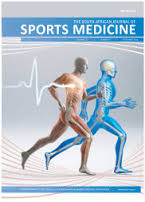Sport during the COVID-19 bio-bubble: Wellness and opinions in South African elite football
DOI:
https://doi.org/10.17159/2078-516X/2022/v34i1a12528Abstract
Background: COVID-19 imposed challenges on professional sport, with restrictions leading to the delay in the completion of the South African Premier Soccer League (PSL). Creating a biologically safe environment (BSE) provided a solution enabling the 2019/2020 season to be completed.
Objectives: Evaluating the impact that the BSE had on player wellness and what coping mechanisms were used in the BSE.
Methods: A questionnaire was distributed to PSL teams on the final weekend in the BSE. It consisted of three validated psychology questionnaires. An additional section focused on the impact and coping strategies during the PSL’s BSE.
Results: A total of 37 completed questionnaires were analysed. General anxiety (4.7±4.2) and depression levels (4.8±3.9) were at an overall low. The health of the players, as well as separation from and concerns about family, were the greatest contributors to anxiety. Electronic communication with family and friends, social interactions with others in the BSE and time spent on self-reflection were important coping mechanisms for players. As time progressed, they adapted to the BSE.
Conclusion: The BSE did not have a negative impact on the anxiety and depression levels of the respondents, with a variety of coping mechanisms key helping them adapt in the BSE.
Downloads
Downloads
Published
Issue
Section
License
Copyright (c) 2022 South African Journal of Sports Medicine

This work is licensed under a Creative Commons Attribution 4.0 International License.
The South African Journal of Sports Medicine reserves copyright of the material published. The work is licensed under a Creative Commons Attribution 4.0 (CC BY 4.0) International License. Material submitted for publication in the South African Journal of Sports Medicine is accepted provided it has not been published elsewhere. The South African Journal of Sports Medicine does not hold itself responsible for statements made by the authors.
How to Cite
- Abstract 889
- PDF 675






.png)